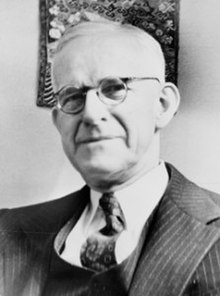Edgar S. Brightman
Edgar Sheffield Brightman (September 20, 1884 in Holbrook, Massachusetts – February 25, 1953 in Boston) was a philosopher and Christian theologian in the Methodist tradition, associated with Boston University and liberal theology, and promulgated the philosophy known as Boston personalism. He was president of the American Academy of Religion in 1942-1943.
Brightman was born in Holbrook, Massachusetts, and was the only child of a Methodist pastor. He studied at Brown University from which he graduated with a B.A. degree in 1907, and then with an M.A. degree in 1908. He then proceeded to Boston University where he was awarded the Bachelor of Sacred Theology degree in 1910, followed by a PhD in 1912. He undertook further studies in Italy at the University of Berlin and Marburg University between 1901–1910.
While at Brown, Brightman became a brother of the Kappa Sigma Fraternity.
He was ordained a Methodist minister in 1912.
Brightman was a professional philosopher who taught the subject at Nebraska Wesleyan University between 1912–1915. He then took up a post as lecturer in ethics and religion at the Wesleyan University in Connecticut from 1915–1919. Finally, he moved to Boston University in 1919 and taught philosophy there until he died in 1953. From 1925–1953 he occupied the Borden Parker Bowne chair of Philosophy.
One of his earliest publications reflected the findings of higher criticism in Old Testament studies concerning the identification of sub-sources and sub-documents within the first six books of the Bible (the Hexateuch). The Documentary Hypothesis that Brightman drew upon had developed in Nineteenth Century German Biblical studies and had received their definitive form in the writings of Julius Wellhausen. Wellhausen, and those who built on his theories, argued that the first five books of the Bible (the Pentateuch) were a composite creation drawing on four original sources and edited into their final form in the fourth century BC. These conclusions ran counter to the traditional Jewish and Christian position that Moses received the Pentateuch from God, with little if any further modification. Brightman was attacked for his pro-Wellhausian views by conservative and fundamentalist Methodists, and blacklisted.
...
Wikipedia

